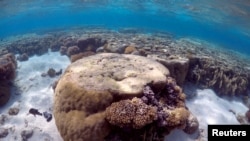A new study is warning that the world’s fisheries and ocean ecosystems are threatened even more than previously thought by rising carbon dioxide levels, and the global marine food chain could collapse.
After reviewing data from 632 published experiments covering tropical to arctic waters, and a range of ecosystems including coral reefs, kelp forests and open oceans, two Australian professors conclude that very few species will escape the negative effects of increasing carbon dioxide.
An exception is microorganisms, such as plankton and algae, which are expected to increase in number and diversity.
They provide food for marine herbivores. But the food situation becomes more dire for the bigger carnivorous creatures that fisheries industries are based around.
That will lead marine life to undergo “a species collapse from the top of the food chain down," according to associate professor Ivan Nagelkerken of the Southern Seas Ecology Labs at the University of Adelaide.
Previous scientific studies have predicted the collapse of commercial fish stocks within the next thirty years.
Mass die-offs of marine animal species
“No species is able to sustain itself in an environment where there's not sufficient food. And these effects are only exacerbated as you go up the food chain,” Nagelkerken told VOA.
Nagelkerken, along with fellow University of Adelaide marine ecologist Professor Sean Connell, were led to conclusions much worse than they anticipated when they first started studying the impact of ocean temperature warming and acidification.
“We didn't expect to see such strong negative responses across so many species in terms of their diversity and abundances,” Nagelkerken said.
Even if carbon dioxide emissions are stopped, oceans will still continue to warm and be acidified for quite some time. But there are things humans can do to mitigate the looming disaster, according to Nagelkerken.
“If we reduce the amount of local stressors, such as pollution of the ocean, eutrophication (process where water bodies receive excess nutrients that stimulate excessive plant growth) and over-fishing, we can actually buy some time. So reduce the number of stressors on these species so they, at least, get some chance to potentially acclimate to global change,” he said.
Ocean acidification affects global climate
As the oceans warm, some species will swim to higher latitudes but the laggards will find their chances of survival greatly imperiled.
The analysis also shows that warmer waters or increased acidification or both, harms habitat-forming species such as coral, oysters and mussels. Any slight change in the health of their habitats is forecast to have broad impact on a wide range of species living in the reefs.
The study also predicts acidification will lead to ocean plankton making less dimethylsulfide gas (DMS). DMS helps increase cloud cover which regulates the Earth's temperature. So, less of the gas means fewer clouds and more warming.
Results of the University of Adelaide study are being published Tuesday in the journal Proceedings of the National Academy of Sciences.





